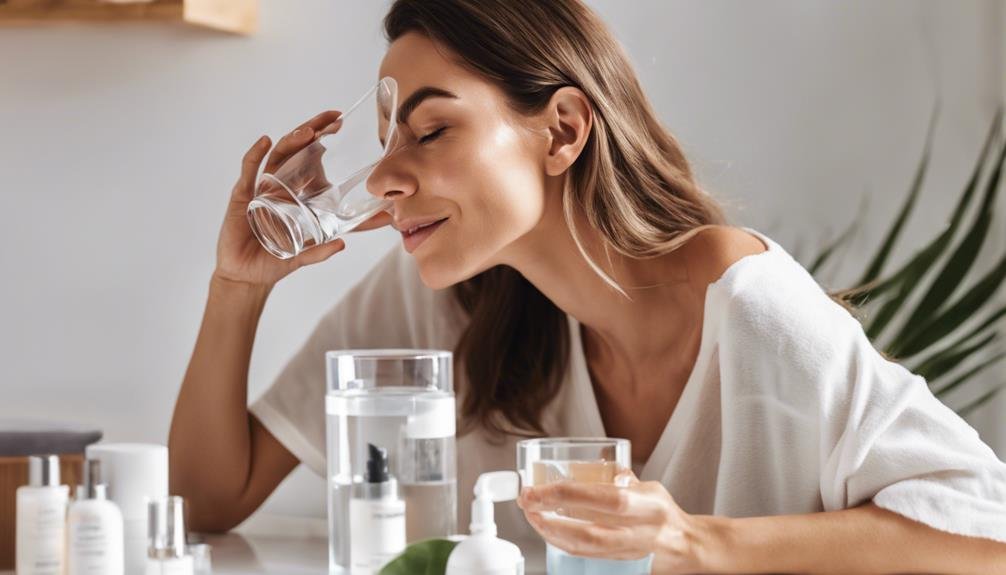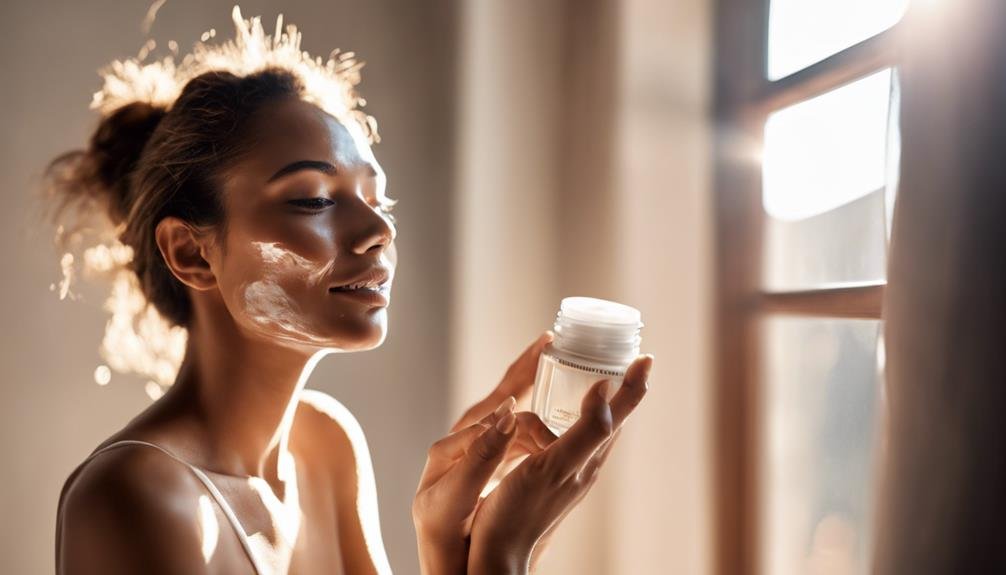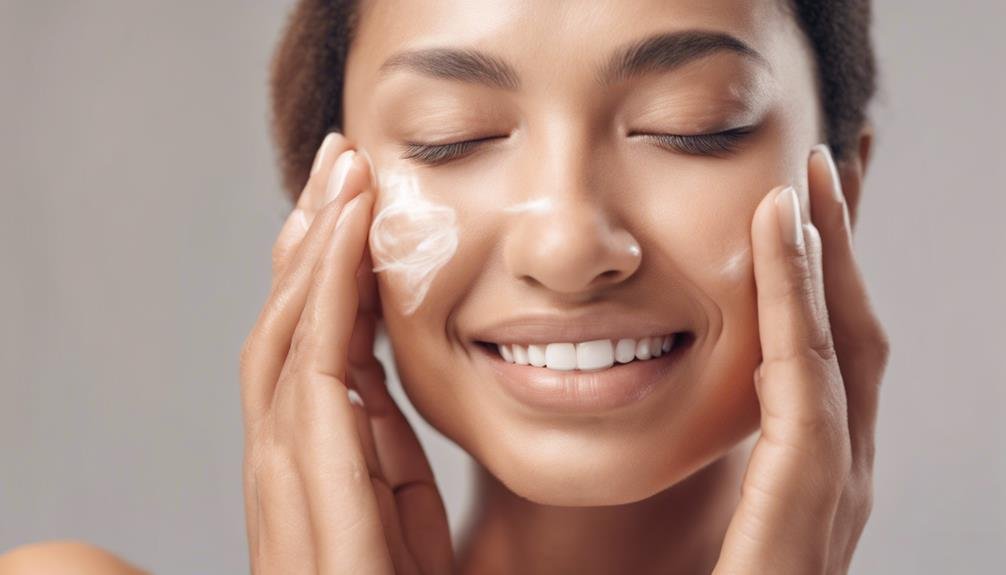"Cherishing Little Steps - A Haven for Baby and Family Journeys"
Essential Tips for Healthy, Glowing Skin
To achieve healthy, glowing skin, you must remember that skincare is not just about what you apply on the surface but also how you treat your skin from within. The path to radiant skin involves a combination of external care and internal balance. By following a few simple yet crucial steps, you can unlock the secrets to a luminous complexion that radiates health and vitality. From the way you cleanse your skin to the foods you eat and the stress you manage, every choice you make plays a role in the quest for beautiful skin.
Key Takeaways
- Stay hydrated for a radiant glow; use hyaluronic acid and glycerin.
- Protect skin with SPF 30 sunscreen; reapply every 2 hours.
- Cleanse gently to remove impurities without stripping natural oils.
- Regularly exfoliate to unclog pores and remove dead skin cells.
- Moisturize daily with suitable products like hyaluronic acid and ceramides.
Hydration Is Key

Wondering how to achieve that radiant, healthy glow for your skin? One of the essential keys to unlocking that coveted luminosity is proper hydration. Hydrated skin is happy skin, and this simple yet crucial step can make a world of difference in your complexion.
When your skin is well-hydrated, it appears plump, smooth, and more youthful. Drinking an adequate amount of water daily helps to flush out toxins, improve circulation, and maintain the skin's elasticity. Additionally, using a good moisturizer that suits your skin type can help lock in moisture and create a protective barrier against environmental aggressors.
Incorporating hydrating ingredients like hyaluronic acid, glycerin, and ceramides into your skincare routine can further enhance your skin's hydration levels. Remember to not only focus on external hydration but also consider nourishing your skin from within by consuming water-rich foods like fruits and vegetables.
Sunscreen Protection
Proper protection from the sun's harmful UV rays is crucial for maintaining healthy, glowing skin. Sunscreen is your best defense against premature aging, sunburn, and skin cancer. Choose a broad-spectrum sunscreen with an SPF of at least 30, applying it generously to all exposed skin, including your face, neck, and hands. Don't forget to reapply every two hours, especially if you're sweating or swimming.
For everyday wear, consider using a moisturizer or makeup that contains SPF for added protection. Remember, UV rays can penetrate through clouds and windows, so wearing sunscreen should be a daily habit, regardless of the weather.
To maximize the benefits of your sunscreen, apply it at least 15 minutes before heading outdoors to allow it to fully absorb into your skin. Additionally, seek shade during peak sun hours, typically between 10 a.m. and 4 p.m., when the sun's rays are strongest.
Cleanse Effectively
To effectively cleanse your skin, it is essential to choose a gentle cleanser that suits your skin type. Cleansing helps remove dirt, oil, and impurities, creating a clean canvas for your skincare products to work effectively. Using harsh cleansers can strip your skin of its natural oils, leading to dryness and irritation. Here are some tips for effective cleansing:
| Skin Type | Recommended Cleanser |
|---|---|
| Dry | Cream or oil-based cleanser |
| Oily | Gel or foaming cleanser |
| Combination | Micellar water cleanser |
| Sensitive | Fragrance-free, gentle cleanser |
Ensure to cleanse your face twice a day, in the morning and evening, to maintain healthy skin. Massage the cleanser gently onto your skin using circular motions and rinse with lukewarm water. Pat your skin dry with a soft towel and follow up with a moisturizer suitable for your skin type. Proper cleansing sets the foundation for a glowing complexion.
Exfoliate Regularly
Looking to achieve a radiant complexion? Regular exfoliation is key to maintaining healthy, glowing skin. By incorporating this step into your skincare routine, you can effectively remove dead skin cells, unclog pores, and reveal a smoother, more luminous complexion. Here are some essential tips for exfoliating your skin:
- Choose the Right Exfoliant: Opt for a gentle exfoliant that suits your skin type to avoid irritation.
- Exfoliate Regularly: Aim to exfoliate 1-3 times a week, depending on your skin's needs.
- Be Gentle: Avoid harsh scrubbing and opt for gentle, circular motions to avoid damaging your skin.
- Focus on Problem Areas: Concentrate on areas where you have more dead skin buildup, like the T-zone or elbows.
- Moisturize After: Follow up with a hydrating moisturizer to keep your skin nourished and balanced.
Moisturize Daily

For healthy, glowing skin, daily moisturizing is a crucial step in your skincare routine. Moisturizers help to hydrate your skin, prevent water loss, and maintain its natural barrier function. When choosing a moisturizer, opt for one that matches your skin type – whether you have oily, dry, combination, or sensitive skin. Look for ingredients like hyaluronic acid, glycerin, and ceramides for effective hydration.
By moisturizing daily, you can prevent dryness, flakiness, and irritation, keeping your skin soft and supple. Apply your moisturizer after cleansing and toning to lock in moisture and nourish your skin throughout the day.
Don't forget to also moisturize your neck and chest area, as these areas can show signs of aging too.
Consistent moisturizing can improve the overall texture and appearance of your skin, giving you a radiant and healthy complexion. Remember, healthy skin starts with hydration, so make daily moisturizing a non-negotiable part of your skincare routine.
Use Antioxidant Serums
When it comes to achieving healthy, glowing skin, incorporating antioxidant serums into your skincare routine can make a significant difference. Antioxidants help protect your skin from damage caused by free radicals, promoting a more radiant complexion. Here are some reasons why antioxidant serums are essential for your skin:
- Fight Against Environmental Stressors: Antioxidants combat the harmful effects of pollution, UV rays, and other environmental aggressors.
- Reduce Signs of Aging: Antioxidants can help minimize fine lines, wrinkles, and age spots, providing you with a more youthful appearance.
- Boost Collagen Production: By stimulating collagen synthesis, antioxidants help maintain skin elasticity and firmness.
- Brighten Skin Tone: Antioxidant serums can even out your skin tone and fade dark spots, giving you a brighter complexion.
- Enhance Overall Skin Health: Antioxidants promote skin repair, reduce inflammation, and support overall skin health for a radiant glow.
Practice Facial Massage

To further enhance your skincare routine and promote a healthy, radiant complexion, consider incorporating facial massage as a beneficial practice. Facial massage not only feels luxurious and relaxing but also offers various skin benefits. Massaging your face helps improve blood circulation, which can result in better absorption of skincare products and a more vibrant complexion. By gently stimulating the facial muscles, you can also promote lymphatic drainage, reducing puffiness and enhancing the overall contour of your face.
Regular facial massages can help alleviate muscle tension, which is particularly beneficial for those who experience jaw clenching or furrowed brows. Additionally, the act of massaging your face can contribute to a natural glow by encouraging the production of collagen and elastin, essential proteins for healthy skin.
To get the most out of your facial massage, consider using a facial oil or cream to reduce friction and provide added hydration. Incorporating this practice into your skincare routine a few times a week can leave your skin looking refreshed and revitalized.
Get Enough Sleep
Adequate sleep is crucial for maintaining healthy, glowing skin. When you prioritize your rest, you aren't just giving your body a break, but you're also allowing your skin to rejuvenate and repair itself. Here are some reasons why sleep is essential for your skin:
- Boosted collagen production: During deep sleep, your body produces more collagen, which helps in keeping your skin firm and supple.
- Decreased dark circles: Getting enough sleep reduces the appearance of dark circles under your eyes, making you look refreshed and awake.
- Reduced inflammation: Proper sleep helps in reducing inflammation in the body, which can calm irritated skin conditions.
- Enhanced skin hydration: Sleep allows your skin to retain moisture better, leading to a more hydrated and plump complexion.
- Improved blood circulation: Quality sleep improves blood flow to the skin, giving you a natural, healthy glow.
Eat a Balanced Diet

Sufficient rest plays a significant role in your skin's health, but complementing this with a balanced diet is equally vital for achieving that coveted radiant complexion. Your skin reflects the overall health of your body, making it crucial to nourish it from the inside out. A balanced diet rich in nutrients like vitamins A, C, E, and minerals such as zinc and selenium can work wonders for your skin.
Including a variety of fruits, vegetables, whole grains, lean proteins, and healthy fats in your daily meals can provide your skin with essential nutrients and antioxidants. These components help combat oxidative stress, inflammation, and promote skin repair and rejuvenation from within.
Additionally, staying hydrated by drinking an adequate amount of water each day is essential to maintain skin elasticity and flush out toxins.
Limit Stress Levels
How does stress impact your skin health? Stress can take a toll on your skin, leading to various issues such as breakouts, dullness, and accelerated aging. Here are some ways stress affects your skin:
- Breakouts: Increased stress levels can trigger inflammation in the body, leading to acne flare-ups.
- Dullness: Stress can disrupt your skin's natural balance, causing it to appear lackluster and tired.
- Wrinkles: Chronic stress can accelerate the aging process by breaking down collagen and elastin in the skin.
- Dryness: High stress levels can impair the skin's barrier function, resulting in dryness and irritation.
- Sensitivity: Stress can make your skin more reactive to external aggressors, making it prone to redness and sensitivity.
To maintain healthy, glowing skin, it's essential to find ways to manage and reduce stress in your daily life. Incorporating relaxation techniques, such as meditation, yoga, or deep breathing exercises, can help improve your overall well-being and skin health.
Exercise for Skin Health

Regular physical activity plays a crucial role in maintaining optimal skin health. Exercise boosts circulation, delivering essential nutrients and oxygen to your skin cells while carrying away harmful toxins. Sweating during exercise helps unclog pores and promotes clearer skin by flushing out impurities. Additionally, physical activity can reduce stress levels, which in turn can help prevent skin issues such as acne and eczema.
Cardiovascular activities like running, cycling, or dancing can increase blood flow, resulting in a healthy rosy complexion. Strength training exercises can also benefit your skin by improving muscle tone and promoting collagen production, which helps maintain skin elasticity and firmness.
Remember to cleanse your skin after a workout to remove sweat and bacteria that could lead to breakouts. Opt for breathable fabrics during exercise to prevent skin irritation. Aim for at least 30 minutes of moderate exercise most days of the week to support overall skin health and radiance.
Consult a Dermatologist
To ensure your skin receives the best care and attention it deserves, seeking guidance from a dermatologist is essential. Dermatologists are specialized in diagnosing and treating various skin conditions, helping you achieve and maintain healthy, glowing skin. Here are some reasons why consulting a dermatologist is crucial:
- Personalized Skincare: Receive tailored advice and treatment plans based on your skin type and concerns.
- Professional Evaluation: Get a comprehensive skin assessment to address any underlying issues effectively.
- Advanced Treatments: Access to cutting-edge procedures and treatments that can enhance your skin's health and appearance.
- Preventive Care: Dermatologists can help prevent future skin problems by providing proactive skincare recommendations.
- Expert Advice: Benefit from expert tips on skincare products, routines, and lifestyle habits that can improve your skin's overall condition.
Frequently Asked Questions
Can I Skip Sunscreen on Cloudy Days?
You shouldn't skip sunscreen on cloudy days. UV rays penetrate clouds and can still cause skin damage. Protect your skin year-round by applying broad-spectrum sunscreen with SPF 30 or higher daily, regardless of the weather.
How Often Should I Change My Pillowcase?
You should change your pillowcase every 2-3 days to prevent oil, dirt, and bacteria buildup. This can help reduce breakouts and keep your skin clear. Consistent pillowcase changes are a simple way to promote healthier skin.
Is It Necessary to Use a Toner?
You should use a toner to help balance your skin's pH levels, remove impurities, and prepare your skin for better absorption of moisturizers. It's a beneficial step in your skincare routine for healthier, glowing skin.
Can I Exfoliate if I Have Sensitive Skin?
Yes, you can exfoliate if you have sensitive skin, but gently and with caution. Opt for mild exfoliants like lactic acid or gentle scrubs. Patch test first and limit frequency. Always follow with a hydrating moisturizer to soothe the skin.
Should I Apply Moisturizer Before or After Serums?
Properly nourish your skin by applying moisturizer before serums. This sequence allows the moisturizer to seal in hydration and the serum to deliver potent ingredients effectively. Enhance your skincare routine for optimal results.
Conclusion
As you continue to prioritize hydration, sun protection, cleansing, exfoliation, and moisturizing, remember that your skin is like a delicate flower. Nurture it with care, and it will bloom with radiance. Embrace a balanced diet, manage stress levels, and stay active to support your skin from within. If you encounter any concerns, seek guidance from a dermatologist to ensure your skin remains healthy and glowing for years to come.

